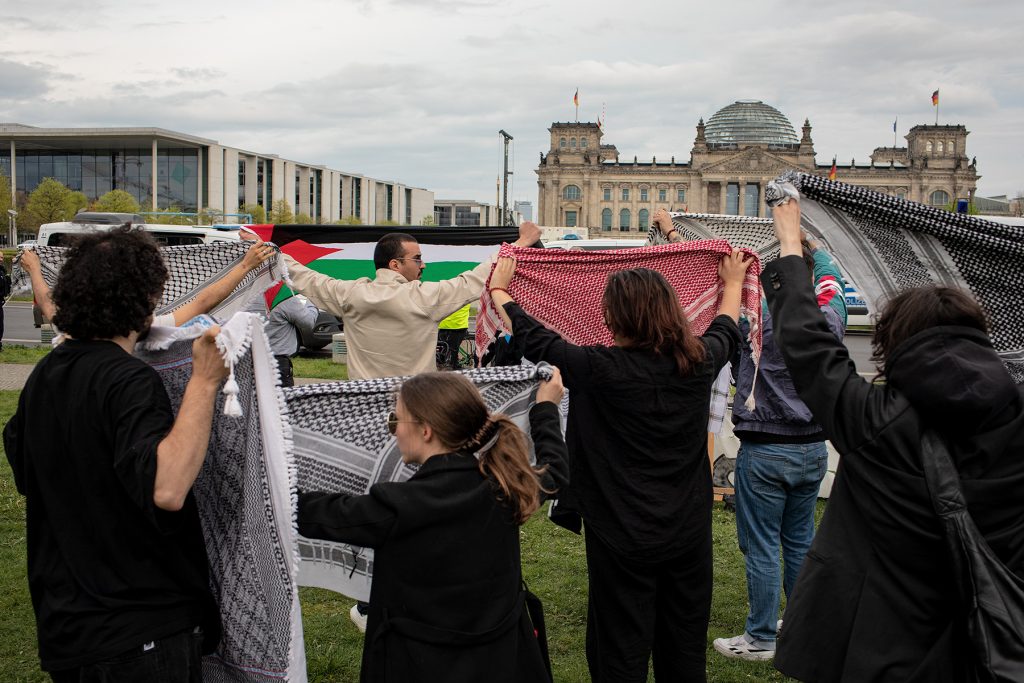Following the Israeli strike on the Iranian embassy in Damascus and Iran’s retaliatory reaction, fears of a full-scale conflict in the Middle East rose. A personal contextualisation.
Dude, they struck back!”
is a notification on my phone from a close friend when I come back home from a Berlin evening on 13th April. I immediately open a flight radar website and notice the sky of Jordan is cleared while a US Air Force stratotanker is seen cruising over the Iraqi sky. Iranian news channels by then were already filled with propaganda about the operation “True Promise,” attacking Israel in retaliation of its lethal attack on the Iranian Embassy in Damascus on 1st April.

parliament in Berlin on April 12th, 2024.
Photo: Kaveh Rostamkhani
While by the minute number of self-proclaimed Middle East experts on air who rely on twitter information is rising, I receive a message from a dear friend in Tehran: “Are you awake?”
I call him back. He woke up to the news of the retaliatory strike and is following the spectacle. Israeli politicians are already bawling with their aggressive masculinity how they’d pulverise Iran. By pure coincidence, I’m outside the country on a brief break. I think of my friends, my neighbours, my place which I recently renovated. All of that becomes relative for a second. Will I see any of them again? Then I realise while my fears are still abstract, it is the genuine feeling Palestinians have been going through for decades. No certainty for nothing.
To structure my thoughts I take my sourdough out of the fridge and start mixing a new bread dough. While folding it we joke on the phone with my buddy in Tehran that I must have had insider information to leave the country just a few days prior to the unlawful Israeli strike on the embassy in Damascus.
We discuss that since the day preceding the operation “True Promise” the violence, the police brutality, and plain cloth forces detaining women defying compulsory hijab started to rise in Tehran. That female friends of ours have been violently harassed earlier that same day. What appears imminent is not the threat of a full scale war or bombing of Tehran as warmongers are already fantasising. The achievements of Iranian civil society with the “Woman, Life, Freedom” movement are at stake.
After a few stretch and fold cycles, it’s time for the dough to bulk ferment and rest. Same for me, it’s nearly 4am, and there won’t be any new reliable information before the day sets between the river to the sea.
The next morning the scale of the Iranian operation becomes clearer. The Islamic Revolutionary Guards went for maximum spectacle, but minimum damage. Not a single life was lost.
Going through social media stories of acquaintances in Tehran, I feel their fear of an escalation to the conflict. I sense the anxiety of affluent Tehran youth who see their comfort threatened. Up until now, apart from surgical strikes and sabotage acts, the conflicts of West Asia and their destruction have been kept outside of the borders of Iran. A fact that Iran has been overtly exploiting in its propaganda and using to justify its military involvement and advisory role for proxies in the region: internal security. Iran argues if it were not for those commitments, it would have become like Syria and Iraq.
Irony is that this granted internal security, doesn’t make everyone feel equally safe.
Irony is that this granted internal security, doesn’t make everyone feel equally safe. I stumble over the story of a female friend: “any woman I speak with these days agrees that we don’t feel like going to the street. We don’t want to be humiliated, beaten, and fined on top of the inflation, the threat of a war and thousand other stress factors on our shoulders.”
I reach out to her to discuss her take on the current rise of systematic harassment of women. She acknowledges in telex-like voice messages that as a remote worker she doesn’t need to leave home for work, and adds “Currently, I don’t leave my place when I don’t have to. We have shifted meetings we’d hold in cafes to our apartments”.
To her, it’s not about the fear – I haven’t seen her wearing hijab on any occasion over the past year, but she underscores: “the humiliation and the stress that goes with avoiding it: you’d need to constantly keep an eye on everyone and everything, to consciously think at all times whether to take a scarf with you. But then have it only in your bag, or handy around the neck?” Yet as video footage from the past days shows, a scarf doesn’t necessarily protect one from the systematic violence currently in place aiming to deprive female bodies of social rights.
An eerie reminder on how similar surveillance and policing strategies of citizens manifest both in Iran and Israel.
Harrowing footage is pouring out of the country every day on how both the police and the plain clothes harass, humiliate, detain and physically assault the women they arbitrarily deem fitting in a blueprint of disobedience. It is to underscore that this harassing and policing behaviour of the authorities is not backed by any law in Iran. Yet, they perform with a sense of staggering impunity. Even the sound of an electric shocker can be heard on a video clip circulated on social media.
Another source reports the intimidating anonymous call from the security apparatus she received after she tweeted the direct war of Iranian people were not with Israel, but the struggle was on the street with the thugs put in place. Another eerie reminder on how similar surveillance and policing strategies of citizens manifest both in Iran and Israel.
At the same time, the new amendment to Israeli counterterrorism law passed last November led to arbitrary incarceration of Israeli citizens expressing dissent or vocalising critique – its latest prominent victim being Nadera Shalhoub-Kevorkian, a professor of law at the Hebrew University of Jerusalem. Various massive protests against the judicial reform, the war, the conduct and atrocities of Israeli military in the wake of the decision of the International Court of Justice confirming a plausibility of a genocide, and even the economic situation can serve as a few indicators for the case of the latter.
Vindictive fundamentalists leading Israel, and extremely conservative Islamists currently in power in Iran are apparently actively seeking and waging bigger conflicts and more destruction. This may be a distraction from and a mean to enforce internal cohesion in regard to the domestic issues they are massively failing at.
As the vicious cycle is continued, I wake up to two messages this Friday. My buddy who was going to fly from Tehran to Qeshm Island at the Persian Gulf for a brief retreat writes “All flights were cancelled without further explanation”. And another text from Eman Mohammed, a Gazan colleague residing in the US reads: “Are you okay? I know you’re not in Isfahan. But still…”. With sleepy eyes I check the news to read about the strikes around Isfahan. It remains unclear what exactly has happened as both Israel and Iran seem to downplay the significance of the attacks – seemingly at an Iranian military airbase. But I can barely digest this level of empathy, knowing Eman had recognised her family’s house in Gaza City on the news while it was occupied by the Israeli military and destroyed by air raids a few months ago.
These double standards performed by the Global North allow Iran to concoct a role and stylise itself as the leader of the resistance of the Global South.
Following the Iranian counterstrike, Western world leaders from the US and the UK to Germany and France were quick to condemn the action while not acknowledging its retaliatory nature. There has been no straightforward condemnation of the strike on the Iranian Embassy in Damascus that clearly goes against international laws by those same leaders and high officials.
These double standards performed by the Global North since October 7th, and their failing to unconditionally condemn Israeli atrocities, allow Iran to concoct a role and stylise itself as the leader of the resistance of the Global South.
The attack on the embassy provided Iran with legitimacy to counterstrike. Figures of the diaspora opposition failed to condemn it. But those hawkish voices are already pleading with a self-righteous utilitarianism and from the comfort of their couches abroad for strikes and tougher sanctions to be imposed on Iran. Thus they’ve been successful at shifting the focus away from the achievements of the Iranian civil society but also at stealing the spotlight from the current humanitarian catastrophe in Gaza and its enablers on the other.
If there is anything to unequivocally plead for when addressing this conflict, it’s first and foremost an unconditional withdrawal of Israel from Gaza and an end to the massacre its military has been conducting there day in, day out. Second, with regard to Iran it is imperative to maintain the visibility of the struggles the Iranian civil society has been going through as it has paid heavily for a breeze of equality. Then, we may discuss the outcome of my sourdough bread.
